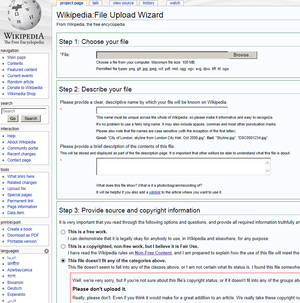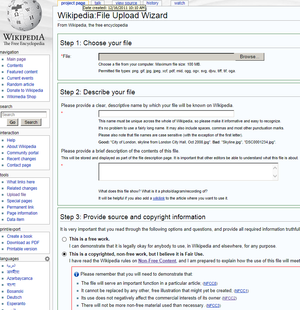Internal talk:Public Policy/Orphan works
Jump to navigation
Jump to search
Outline
Organizing constraints: Speaker has little time -- 5 minutes? 10? and audience does not know Wikimedia. Because there are many speakers, the orphan issue itself is likely to be explained clearly and we do not have to do that in detail
Background
- What are orphan works?
- What copyright-related materials do we store in English Wikipedia and Commons? (Explain Commons)
- How Wikimedia projects have benefited from public domain works: media in Commons, text in Wikisource and Wikipedia, etc..
Legislative details
- What do we want in proposed legislation? (likely answer: a feasible, mechanized procedure that Wikimedians can systematically follow that gets us to a "safe harbor" for the orphan/ambiguous cases -- and if a copyright owner shows up we understand the orphan rules don't apply any more and we need permission)
- We might want to illustrate proposed solutions in very practical terms, e.g. with screen shots, to communicate how we'd use it. Communicate that we address this class of issues frequently, and that hundreds of people do so.
- What do we think of the proposed solutions, e.g. in the Copyright Office's 2006 report? Would some be too burdensome for use on Wikimedia projects? (possible answer: they're good, but in addition we'd like to avoid marking up the content being used with an "orphan" stamp, and put that info in the metadata instead if we can)
- How are Wikimedia's needs different than the more well-known case of Google Books etc.
Comments from Slowking4
- Slowking4 says we want a procedure that we can say we followed in the metadata of an uploaded file. We'll put it in the licensing terms e.g. on commons. It gives a "safe harbor" - a defense for the good faith. we could also have a licensing procedure going forward. they could migrate it to flicker, after it had been digitized by Wikimedians. The copyright holder would benefit from it. (just pennies normally). it cuts through the uncertainty. if we agree to the procedure we can keep these cases out of court. This way nobody needs to threaten that. We are already doing well at crediting the source of photos."
- "We're in favor of any reform." We do not need to take a specific stance on specific legislation here. Our principles are clear and simple.
- We can mention in our briefings in April, and suggested congressional briefings prep on April 12, and briefings themselves on April 14. Could include students.
Points we'd want to make
- we want to avoid anyone having to pay an self-defense fee in escrow. that's an undue burden
- we want to avoid other undue burdens'
- we want the procedure to be simple
- we like the idea that not-for-profit uses have a low low cap or zero on how much they owe for infringement. there is a list of institutions that are eligible for a zero-fee. That includes museums and archives. We would like Wikimedia foundation projects to be on that list
- low-res thumbnail-size pix? as an icon. or for identifying a person or subject? JS says this is a fair-use situation now. Maybe not relevant to orphan works
- Commons's rule is that the material must be in the public domain in the U.S. and in the country-of-origin
- Straightforward rules written at the eighth grade reading level are necessary if you are serious about satisfactory compliance from high school students and people who speak English as a second language. Complicated and difficult rules are unlikely to result in satisfactory compliance by high school students and second language speakers. The Internet makes it possible for people of all ages and language abilities to interact with digital works, and our rules on copyright need to be usable by the full spectrum of Internet users.
- Wikimedia is systematically careful about copyright

